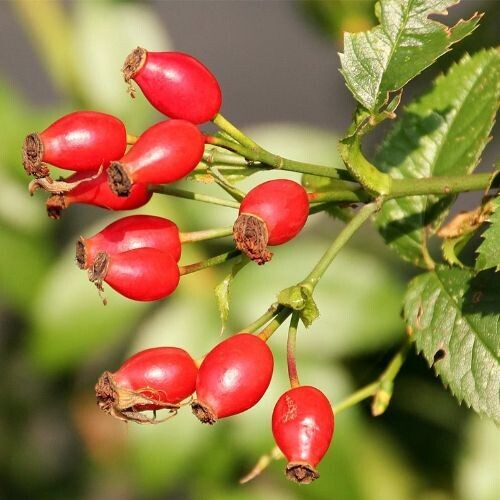ROSEHIPS (Rosa canina)
Available as chopped rosehip shells or tea-bag cut form.
Please note this is a nutritional, functional horse food supplement and not veterinary medicine. See Dr Kellon's Horse Sense - 'Nutrition is not 'Alternative' Therapy.
Produced to ecological standards and free from agro-chemicals.
Composition & Feed Guide
~ Composition
Certified organic Rosa canina (Rose) Hip Shells, Wild Harvested, Organic Fairwild , Origin Croatia
~ Feed
- 5g/100kg bodyweight per day, thus for an average 500kg horse add 25g daily to feed.
- 1-year shelf-life.
Functional Nutritional Value
Constituents: Carotenoids (lycopene), vitamins C, E, K, B3, B9, and A, minerals (potassium, calcium, and magnesium), phenolic compounds (flavonoids), tannins, and polysaccharides (pectin).
NB. Our range of botanicals are all grown, harvested and dried without the use of agri-chemicals, non-irradiated and GMO free - see our Quality page for Quality Management & Certification Documents. Laboratory tested for identification and compliance to the British and European Pharmacopoeia standards, and human grade.
Please be aware that if you're purchasing our dried botanicals for human use, our dried range is cut to appropriate sizes for feeding to horses.
More ...
A longtime symbol of love and beauty, the Rosa genus boasts over 100 different species and more than a whopiing 18,000 cultivars. Today the rose is probably most commonly known for its prominent role in aromatherapy, plus both rose blossoms and hips have been used in herbal traditions around the world for many thousands of years. The oldest extant records show that the rose even pre-dates us humans!
However, here at EquiNatural we’re only interested in Rosa canina , aka dog rose, and as we only feature the hips in our blends, I'll skip all the historical text on the petals, lovely as they are.
In Western herbalism the energetics of rosehips are viewed as drying and cooling, with the flavonoid-rich hips nourishing the system in a tonic fashion and their major herbal actions being astringent, refrigerant, and antioxidant.
They’ve been used since ancient times as a vulnerary (wound healer) that promotes tissue repair, as well as a preventative of oxidative DNA damage and free-radical scavenging activity. You've probably seen beauty creams including rosehips, which studies confirm that they can sustain skin youthfulness, based on markers such as wrinkles, elasticity etc. (Phetcharat et al., 2015).
However, they're probably known best for their extraordinary source of vitamin C, as well as one of the best sources of natural iron - for this reason alone rosehips are super-beneficial as a natural supplement, and especially valued for boosting the immune system. The hips of R. canina were particulary important during WWII, when people were encouraged to take them for their vitamin content, for which they’re still very much recommended for today. Nearly 200% of the RDA is found in just 1-ounce of R.canina rosehips; they’re also a good source of vitamin A, calcium, and magnesium.
Their vit.C content, thought to contain 60 times the amount of vit.C than lemons, makes them a potent antiviral, immunity supporter and circulatory stimulant, helping to restore and maintain a healthy vascular system and prevent damage to fragile capilliaries, being especially useful for strengthening blood vessels and the elasticity of the arteries. They're also well known for their major role in kidney rehabilitation and adrenal function.
Natural vit.C and bioflavonoids are combined in nature, and to get the best results it’s essential that they be used together. The good news is that rosehips are rich in both, and due to their high vit.C content, they’re helpful in enhancing the immune system. They're thought to avert many types of infectious ailments before they happen by feeding them as a preventative on a daily basis – anyone remember being given Delrosa Syrup back in the day?!
Vitamin C is also a key antioxidant found in lung tissue; historical folk traditions commonly made use of them in syrup for sore throats, coughs and colds. When it comes to our horses, studies apparently show that Vitamin C levels are low in the lungs of horses with respiratory issues.
A 2012 clinical study of the effects of rosehip tea on the risk markers of diabetes and cardiovascular disease, found that after 6 weeks, cardiovascular risk was significantly reduced through the lowering of systolic blood pressure and cholesterol levels (Andersson et al., 2012).
Rosehips are also increasingly of interest in research on joint conditions, having also been used in folk medicine for arthritic inflammation. A meta-analysis of the available studies using rosehip powder from R. canina to reduce osteoarthritic pain concluded that rosehip powder does indeed have analgesic effects. More recently, a placebo-controlled double-blind study used rosehips from R. canina in a herbal compound formula for arthritis and noted its success over placebos (Moré et al., 2017).
Finally, a bit of rosehip trivia for you - it's well known that the rosehip seed has tiny hairs which can itch the skin like crazy, but did you know that the French call the hips ' gratte-culs' , which translates as 'scratch-butt'!.
We use rosehips extensively in our blends – you’ll find it them in our EyeTonic, JSTTonic and MetaTonic, our OptimaCARE detox programme, and of course our WildVits. In addition to supporting overall health, Vitamin C is also helpful in stimulating dopamine, which is why our CushTonic (dried MK.I version) and MellowMare also have a generous measure of them.
Safety
- Rose is generally deemed very safe.





